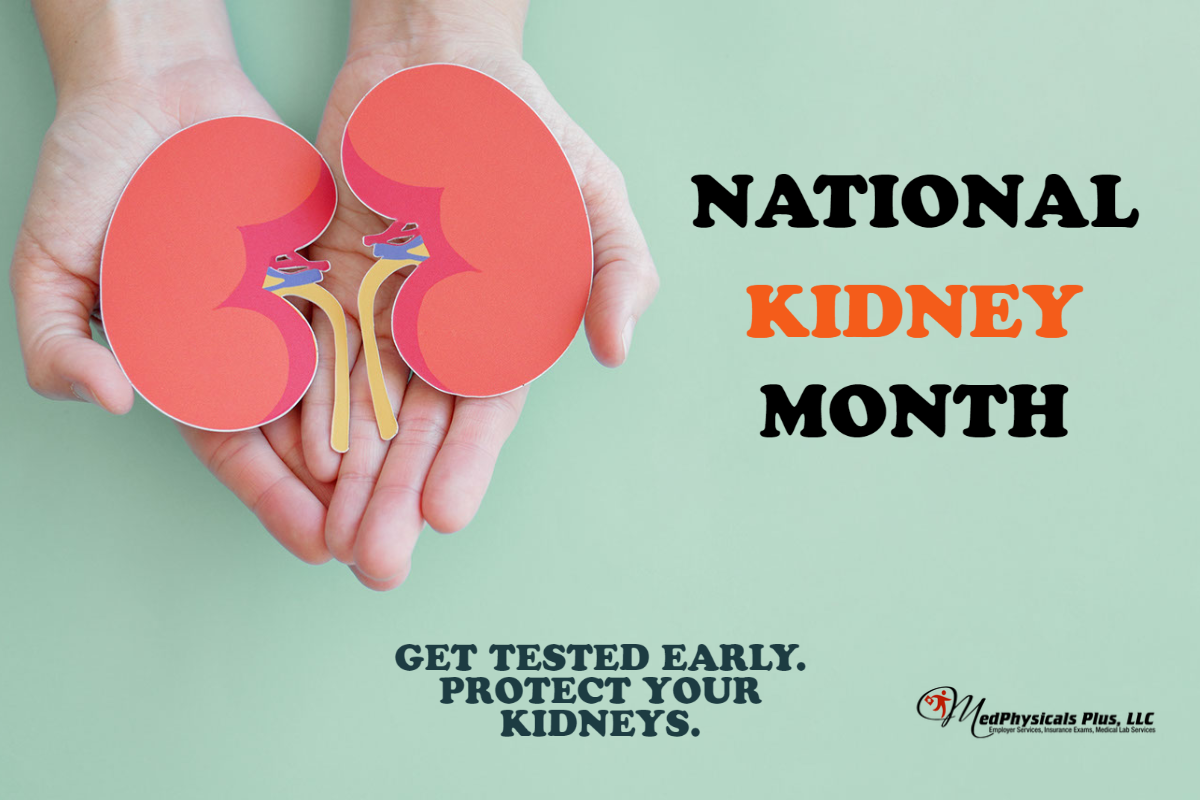MedPhysicals Plus offers blood testing that can prevent and detect kidney and renal disease. March is Kidney Month, which is used to raise awareness of kidney disease and how to treat, identify, and understand it. Our renal function test is only $25! This test can determine the ability of your kidneys to dispose of “waste.” This is a blood test. We also offer a urine test. If you are interested in the basic science behind this test, check out this YouTube video. Our urinalysis or UA complete test is offered separately and discounted as part of our “Women’s Health Package.”
What does your urine say about your kidney health?
Red or dark brown urine
Blood in the urine, called hematuria, occurs when the filters of the kidneys or another part of the urinary tract aren’t working correctly or are damaged.
There are two types of hematuria:
Microscopic hematuria: There will be no visible signs of blood to the naked eye, which is why frequent urinalysis tests are so important.
Gross hematuria: Urine appears red or the color of tea or cola.
Foamy, Fizzy, or Bubbly urine
Bubbles, especially those that require multiple flushes, can be a sign of protein in the urine, or albuminuria (proteinuria). If the kidneys are damaged, protein, which belongs in the blood, can also get filtered out. Protein doesn’t always make urine foamy or fizzy, so a urinalysis is the only way to know if it is there.
Urine with a Strong Odor
If you notice that your urine smells more than usual, don’t be alarmed. Dehydration or certain foods like asparagus or Brussels sprouts can cause bad-smelling urine. However, it’s always better to be safe than sorry, so let your healthcare professional know. They will determine whether you need a urinalysis.
When should I get tested?
If you notice anything unusual with your urine, such as the qualities mentioned above, it is better to get it tested immediately. It is an affordable and painless test that can prevent severe kidney damage. Even if everything seems fine, it may not be. We recommend getting a complete urinalysis or a renal function test.
“Unless you are doing an annual checkup,” said George, “getting blood work or so forth, you don’t know what’s going on inside your body. My kidney failed because of glomerulonephritis, which isn’t something that generally shows up unless you’re having a checkup or some bloodwork,” notes George, a man with a kidney transplant for 46 years.
If you have a history of renal or kidney issues in your familyyou are at risk for kidney disease, then we suggest our full renal blood package. If you have high blood pressure, diabetes, heart disease, are overweight, or have a family history of kidney disease, you could be at risk for kidney disease.
How do I know if I am at risk for kidney disease?
1 in 3 adults in the United States is at risk for kidney disease. Several well-known conditions are the main risk factors for kidney disease:
- Diabetes: Diabetes is the leading cause of kidney disease. If left untreated, it can damage the small blood vessels in the kidney.
- High blood pressure: High blood pressure is the second leading cause of kidney disease, and many are unaware that they even have it. If untreated, the blood pressure can damage the tiny filters in the kidney.
Other causes of kidney disease include: family history, social factors, age, and diet. Some signs of kidney disease are:
- Feeling more tired than normal
- Not sleeping well
- Itching
- Urinating more or less often than usual
- Foamy urine
- Blood in urine
- Persistently puffy eyes
- Swollen arms, legs, feet, or ankles
- Poor appetite
- Muscle cramping
Take this one-minute, free quiz to determine your risk of kidney disease.
We test for glucose, BUN, creatine, sodium, potassium, chloride, carbon dioxide, calcium, phosphorus, albumin, and globulin as part of our full kidney screening. Blood urea nitrogen, or the amount of urea nitrogen in your blood, Urea nitrogen is a waste product your body makes from the breakdown of proteins in the foods you eat. Healthy kidneys filter urea nitrogen out of your blood, and it leaves your body through your urine. This process helps keep your BUN level within a normal range. A normal level of urea nitrogen will depend on your age and any other health conditions you may have, but usually ranges from 7 to 20. If your levels are higher than normal, this may be a sign that your kidneys are not working as well as they should. As kidney disease progresses, your BUN level goes up (CDC).
A serum creatinine blood test measures the amount of creatinine in your blood. If your kidneys are not working like they should, your serum creatinine level goes up. Normal levels for you will depend on your sex, age, and the amount of muscle mass your body has.
If your BUN level reveals signs of kidney disease, your doctor will use your BUN test results, along with the results of other tests, to decide on a treatment plan that best fits your needs. Use this blog post to receive the best test and rate available. This test will also examine your glomerular filtration rate (GFR). The GFR is a measure of how well your kidneys remove waste, toxins, and extra fluid from your blood.
Some of the information in this blog is used with permission from Kidney.org.

